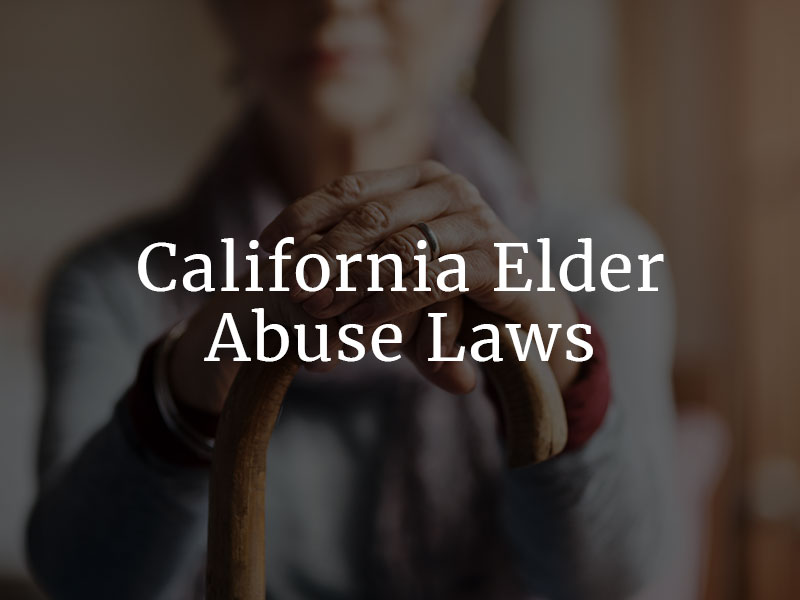Elder Abuse Laws in California
Elder abuse is a serious offense that can destroy lives. Elder abuse targets one of the most vulnerable populations: senior citizens. Someone may abuse an elderly person because of the victim’s vulnerability, defenselessness or for financial gain. California lawmakers do not tolerate elder abuse or neglect. The state has strict laws in place prohibiting abuse among nursing homes and caretakers.

What Is the Definition of Elder Abuse?
An elder in California is someone 65 years or older. The crime of elder abuse under California Penal Code 368 is to knowingly put an elder in a situation that could end in great bodily harm or death, or to intentionally inflict suffering, physical pain or mental anguish on an elder. Willfully injuring, endangering or negligently permitting an elder’s health to decline is also elder abuse. The punishment for committing the crime of elder abuse in California is fines of up to $6,000 and/or imprisonment for two to seven years.
Elder abuse is also a civil tort. California Welfare & Institutions Code Section 15610 defines it as the physical, mental or financial abuse of an elder or dependent adult. This can include abandonment, neglect, isolation, abduction, sexual assault, physical harm, mental suffering and financial exploitation. An abuser could face both criminal and civil liability for elder abuse in California. Criminal liability can lead to sentencing, while civil liability could force the abuser to pay the victim restitution.
Where To Report Abuse in California
Some victims may come forward with abuse allegations, but most do not report abuse. Elder abuse and neglect remains widely underreported due to victim incapacities, fear and lack of reporting outlets. It is often up to family members of the abused to notice signs of something wrong and report it to the correct authorities. Signs of elder abuse can vary depending on the situation and type of abuse.
- General agitation
- Mood changes
- Withdrawal from social activities
- Depression
- Fear or anxiety
- Reluctance to be alone with a certain caretaker
- Unusual or unexplained injuries
- Malnutrition or unkempt appearance
- Overall decline in health
Listen to your loved one’s complaints about a nursing home, hospital or caretaker. Take mentions of any physical, verbal, emotional or financial abuse seriously. Look for red flags during your visits. If you find evidence of elder abuse, file a complaint against the perpetrator with the California Department of Public Health (DPH). You can file your complaint over the phone or in writing. Notify other authorities, such as the Bureau of Medi-Cal Fraud & Elder Abuse, as well. The DPH must get back to you with information about an investigation within two days of receiving your complaint.
Statute of Limitations on Elder Abuse Lawsuits
If the DPH agrees that your loved one has been the victim of elder abuse, your family may have grounds to file a civil lawsuit against the nursing home or offender. The statute of limitations on elder abuse claims differs from state to state. In California, you have two years from the date of the injury to bring your lawsuit. If your case involves fraud, you have three years to file your claim.
Your family will have four years of the date you discovered financial abuse to file a lawsuit for financial exploitation. You will only have one year from the date of the death of your loved one to file an elder abuse wrongful death lawsuit. An exception to the statute of limitations might exist if the victim has mental or physical incapacitation, or if the victim did not discover his or her injuries until a date after the act of abuse.
Bringing your lawsuit by the deadline is very important. Most courtrooms in California will not hear an elder abuse claim after the statute of limitations has passed, no matter how compelling the evidence against the defendant. Working with a San Diego elder abuse lawyer could help your family meet your specific deadline.

